On Tuesday the 20th of May Harper Design publish The Art of Neil Gaiman, written by Hayley Campbell. (The book was originally commissioned by Ilex Press on this side of the Atlantic, but we won’t see it until July, not that we’re in any way bitter, you understand.) Effectively, this is a companion volume to their recent – well, 2011 – Alan Moore: Storyteller by Gary Spencer Millidge, which you should all have by now. Anyhow, when I heard that Hayley was doing the book, I decided that nothing would do me but to interview her, if I could.
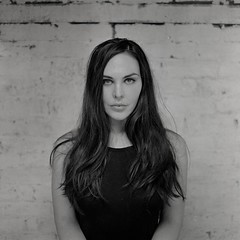
[That photo is by Ellen Rogers, and used with her permission.]
Perhaps more interestingly, Hayley is someone who has literally come alive off the pages of comics. Her father, Eddie Campbell, produced a vast body of work these past many years, much of it autobiographical, which by default contains all sorts of stories about his family. So we got to see Hayley growing up in the pages of his books, before she actually appeared fully grown in London, writing not only her own blog, but for the New Statesman, McSweeney’s, The Guardian, The Comics Journal, and various others.
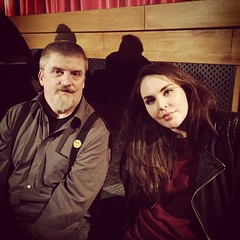
Anyway, that’s enough from me and, finally, and without any further ado, here’s that interview…
==============================================================================================================
Pádraig Ó Méalóid: How did you end up writing a book about Neil Gaiman?
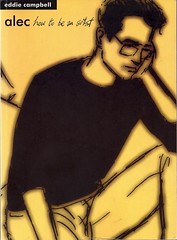
PÓM: Why did you decide to move to London?
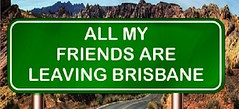
Plus I was born here and the photo in my British passport is so much better than the horror in my Australian passport.
PÓM: Have you ever had the urge to move back to Australia, or are you up this side for good now?
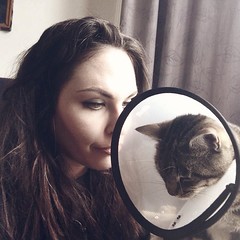
PÓM: You know I’m going to have to ask you for scans of both of those passport photos, right?
HC: They’re ‘government secrets classified.’ You can have my railcard though. I look hot like Ulrike Meinhof.




[Only one of these is Hayley Campbell. The others are Ulrike Meinhof, Joan Jett, and the divine Gaye Advert, which is who I think she looks most like.]
Here it is, featuring the last haircut I was given before leaving Australia. In Australia you see haircuts you don’t get anywhere else in the world because they are too terrible to export. This is one of them. Also, related (people think I’m being offensive when I say this but it’s true): in Australia people with Down syndrome all have identical haircuts. So much so that it looks like it’s government-issued (it’s still quite a racist country so it’s kind of an extension of that, only with haircuts, probably). One of the things that blew my mind when I moved to London was seeing a whole group of Down syndrome guys with a variety of haircuts. Any haircut they liked. One had a wee mohawk. I did a proper Keanu ‘Woah.’
So anyway, one of the first jobs I got right after being fired from a restaurant in Mayfair was writing website stuff for Forbidden Planet. While I spent much of that time doing what I was paid to do I’m just going to come clean (hi Nick Landau) and say that I spent most of my time on the internal instant messenger to Titan editor Nick Jones. When he up and moved to Ilex Press (who published Gary Spencer Millidge’s Alan Moore: Storyteller) it was his idea to give the Gaiman book to me.
PÓM: Can I ask why you got fired from the restaurant?
HC: Uh. Because I refused to go and buy cigarettes for a rude businessman who tugged on my apron. Because I got stuck in the stairwell with three plates of venison and could not go forward or back without throwing the venison in the air so I chose to wait and be stuck for about ten minutes until someone found me, by which point everything was cold anyway. Because I hid and cried in the fridge on a regular basis while eating olives straight from the massive jar. Because I accidentally tipped the massive jar of olives over and a thousand olives tumbled down the stairwell I’d recently got stuck in. Because I got drunk and embarrassing while hosting a wine tasting and kissed the chef.
Any number of reasons. All of the reasons. I would have fired me, I was a fucking shitty waitress.
PÓM: Speaking of food, is it true that you’ve a great fondness for Hummus? [See here for irrefutable proof.]
HC: I’m about 98% chickpea.
PÓM: Was it not Tim Pilcher who commissioned the book while he was at Ilex Press?
HC: Yeah, Tim phoned me up while I was on lunch at Gosh! (the London comic shop I worked in for five years) in March 2010. I thought he was nuts and spent the rest of the afternoon being talked into it and out of it by various people. My dad just bombed my inbox with emails about how much of an idiot I’d be not to do it. I was iffy because I thought it would be a bit weird to do since I was so close to Neil — which is exactly why Tim thought it was a good idea, but it was also why I thought it might be a bad one. In the end I just emailed Neil that night and said ‘I know this is weird, but will you be my Duran Duran?’ He said no, but he’d be my Douglas Adams (as long as I came out to America for a week to go through his attic and walk the dogs). If anyone else had asked to do the book I think he would have said no.
Between doing the plan for the London Book Fair and actually writing it was about two years, I think, because of publishing and contractual-sorting-out reasons (it’s co-published in the States by Harper Design). Then there was a year and a half between me finishing writing it and a copy arriving in the post. I had a day job while I wrote it at nights and on weekends so I barely saw anyone for about six months. I wore one particular cardigan until it died and I got a bit fat.
PÓM: You knew Neil Gaiman from before you came to London, though, didn’t you?
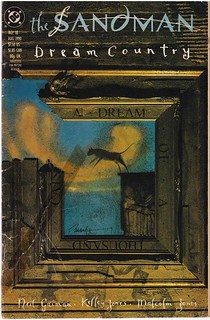
So Neil came to stay and I got kicked out of my bedroom so he had somewhere to sleep. He read me the first draft of The Day I Swapped My Dad For Two Goldfish off his laptop and I thought he was the greatest thing in the world. I see him talking to kids now and I know exactly what’s going on in their tiny heads. Neil doesn’t talk to kids like they’re stupid or too young or whatever — he gives them his absolutely undivided attention in the middle of the clusterfuck that is a Neil Gaiman signing and he talks to them like they’re adults, like he is genuinely interested in what they have to say (because he is). 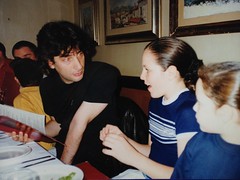
Then Neil kicked me out of my bedroom again when I was about 12. In exchange he let me wear his jacket for a bit. It’s what Neil does. He kicks children out of their bedrooms and placates them with stories and leather jackets they drown in.
PÓM: I’m pretty sure I’ve seen at least some of that in one of your father’s books, at some point. Which is a thing I wanted to ask you about: seeing as Eddie was chronicling his own life as he was going along, it meant he was by extension chronicling your life, as well. Do you have any strong feeling about that, these days, now that you’re grown up?
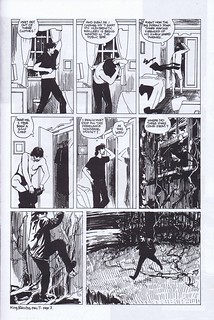
[It’s actually in Bacchus Book Nine: King Bacchus, or you can click on the image for a larger version.]
I love the autobiographical stuff. There were moments as a kid when I didn’t — if you were about to do something bad the threat was never ‘you’ll be grounded’ or ‘there’ll be no telly for a week’ it was ‘if you do that I’ll put it in a comic’.
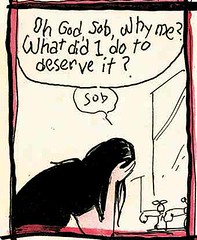
[A panel from the Angry Cook strip in The Fate of the Artist.]

HC: I’m a daddy’s girl, always have been (or at least that’s what gets shouted at me if I take his side in an argument which is mostly). When I was really little he was at home all day drawing From Hell and Mum was out doing a real job and making actual money so that we had stuff to eat and didn’t die, etc. We’d go and meet her at the train station at the end of the day, both of us having spent the day drawing comics.
Also our brains are similar. Well, until recently. He thinks Two and a Half Men is a good TV show.
PÓM: How about Neil? He’s your godfather, isn’t he? How do you get on with him?
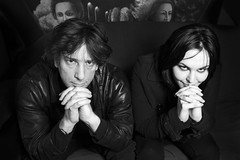
I love Neil. He’s been one of my favourite people in the world since I met him.
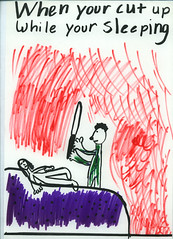
HC: I ended up doing it because that’s what I thought you were supposed to do: sit at home all day drawing horrific pictures of people being cut up while they’re sleeping. I didn’t have anything else to go on. Dad did it first.
I’d love to get it printed. Unfortunately that involves getting something organised and sending it to a place and it might even involve going to the post office which is something I strive to avoid.
PÓM: When you say you were his Doctor Who girl, does that mean you went off on adventures through space and time with him? Or just that you were his feisty young female companion?
HC: I wouldn’t say I’m feisty. More looming. I loomed next to him in various cities on earth including ones In Europe which is basically all of time and space when you’re talking to someone who grew up in Australia, which I think is technically light-years away from any other country in terms of time spent on planes.
My favourite Doctor is a toss up between Tom Baker and Neil Gaiman. Neil’s winning because he fed me.
He’s got a new companion now.
PÓM: You mentioned it was Polly Adams, who is Douglas Adams’s daughter, isn’t she? Do you all have some sort of Daughters’ Club, that you all hang around in? I know you shared a flat with one of Neil’s daughters, and that you’re friends with Leah and Amber Moore, Alan’s daughters, so the evidence is starting to mount up, to be honest.
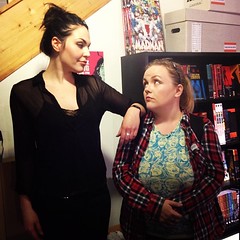
I think the Daughters’ Club only exists on the internet. I met Amber when I was tiny, and I met Leah a few months ago. There’s a picture of us together where we look like different species.
PÓM: Can you give us examples of how Polly Adams saved your arse, all those times?
HC: There was an incident with a drunk person who may or may not have been me, who lost her jacket at a wedding and then shouted at the groom because ‘all of his guests [were] thieves’. Polly may have taken this drunk person and locked her in a tiny museum of wartime army uniforms until she calmed down. For example. The jacket was on the back of a chair.
PÓM: You’re on the Great Wall of Vagina. Why did you decide to do this? It is, after all, a very public thing to do with a very private part of yourself.
HC: I only did it to be polite after I was kind of rude to the sculptor at dinner by being a dick about vaginas. He said he was doing this great thing about female body image and acceptance and blah blah blah and I was all: yeah but have you heard this one in Roger’s Profanisaurus?
(It was ‘Attenborough’s Passport: fanny like, sim. Descriptive of a lady’s bodily treasure which is distinctly dog-eared and well-thumbed in the style, one would imagine, of the erstwhile globe-hopping naturalist’s travel documents. “Christ almighty, I knew she’d been round the block a few times, but when I got down there she had a fanny like Attenborough’s passport“.’)
Anyway, I learned two things: 1) it turns out Viz lied, you absolutely cannot tell what a woman’s been up to just by how flappy her bits are, and 2) trying to find your own vagina in a wall of 360 plaster vaginas is hard. I narrowed it down to about five.
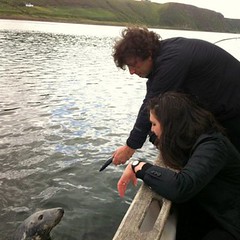
[Neil and Hayley, hard at work on the book in Scotland.]
HC: After his 50th birthday party in New Orleans we went to his house in Wisconsin and I sat up in his attic going through boxes and boxes of stuff. Old scripts and notebooks and pages of ’80s porn magazines that had hairy vaginas on one side and Neil interviews on the other. We went walking with the dogs in the woods and I’d regret not bringing my dictaphone. Interviews are better in the woods with dogs.
And then in the summer of 2012 we went to middle-of-nowhere Scotland and did a week of interviews by the fire. We went walking over fields and craggy mountainy bits and I had the same regret about the dictaphone.
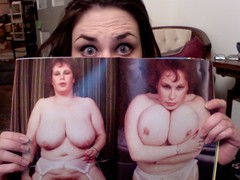
HC: Neil used to slice all his interviews out of Knave and file them away in a folder. His work tended to immediately follow the centrefold, so frequently only included the bottom half of the lady on the back of the page. If someone else found it and thought it was purely a porn collection they’d think it was a very specific one. Just dozens of big hairy ’80s bushes.
PÓM: Were there any places when you were interviewing Neil, where you were trying to get something out of him, but he wasn’t giving you the answers you wanted? I know, from occasional interviews with him myself, that he’s very good at gently moving things along and you finding that he has avoided the question. So, I was just wondering if that happened to you too, or if he was more forthcoming seeing it was for a proper book.
HC: He would give me all the answers I wanted plus loads of things that were entirely irrelevant because it was just me and him talking in a room and we do that all the time. It was a weird interview to do. I only noticed this was happening when I had to transcribe 17 hours of it back in London, and sat there listening to us trying to save a bumblebee who’d got caught in the fireplace. For half an hour. ‘Ooh he’s got soot on him. Look at his giant cardigan. Shall we put him outside on a flower?‘
Honestly I think I have to burn the tapes.
PÓM: I’m guessing this isn’t going to be your one and only book…?
HC: I’m working on a novel. And I’m collecting a bunch of essays together. Hopefully one or both of these will turn into a real life thing very soon (or four years from now if The Art of Neil Gaiman is anything to go by).
PÓM: Do you want to tell us any more about those two books? I know you’ve done a lot of writing for various publications, and online, so can we expect to see some of that in the book of essays?
HC: Yep, plus stuff I’ve read live but never put online. I’m saving them for the book.
PÓM: Am I right in thinking you once did a stint at the Edinburgh Festival, about doing the book with Neil?
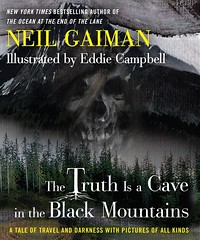
PÓM: Fair enough. A man can’t remember everything correctly! [This is what I was thinking of, it turns out.] The Truth… is a thing he’s done with your father Eddie, right?
HC: Neil reads the story live accompanied by a string quartet called Fourplay who are excellent, and Dad’s paintings are projected behind him. They did it at the Sydney Opera House back in 2010 first but I missed it because I was in the wrong bit of the world. They’re taking it to Carnegie Hall in July. When I see it at the Barbican it’ll be for the first time. The book of it (available June) is beautiful and craggy and Scottish.
PÓM: And that more or less brings us all the way around to where we started. Or at least it does in my head. Hayley, thanks for taking the time to answer my questions. It has been a pleasure.
HC: No problem. Thank you for convincing The Beat it would be a good idea.
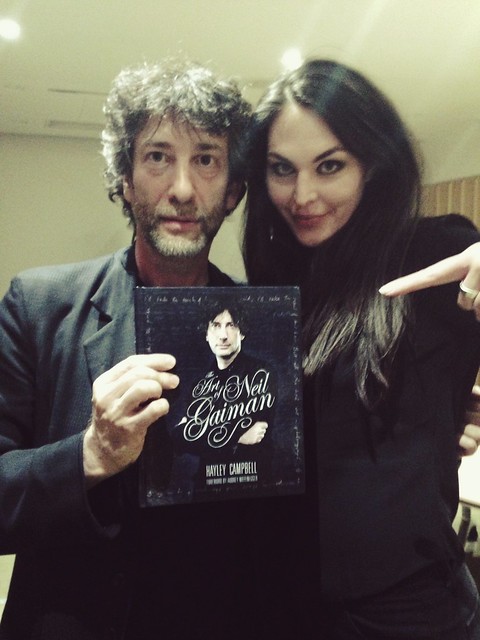
Neil Gaiman, Hayley Campbell, and the book
The Art of Neil Gaiman is published by Harper Design in the US on the 20th of May 2014, and can be bought on Amazon.com or through you local comic or book shop. It will be published in the UK by Ilex Press on the 16th of July 2014, and can be pre-ordered from Amazon.co.uk, or from your local comic or book shop. And, if you don’t already have it, you could buy yourself Gary Spencer Millidge‘s Alan Moore: Storyteller as well. You’ll never regret it!


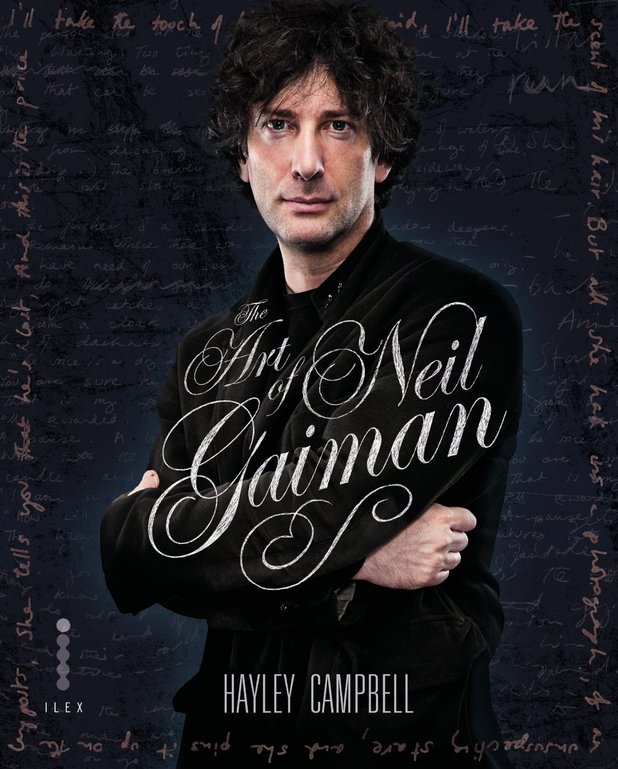
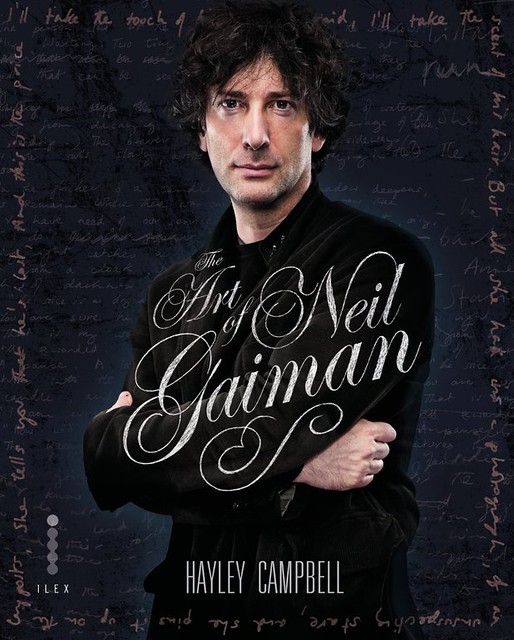


Sounds pretty interesting, but I am always skeptical about interviews or books written by somebody so close to the subject. They always seem to be missing something in my mind. Or perhaps they just include a perspective on the subject that I just am not looking for. That being said I am sure I will buy “The Art of Neil Gaiman” when I get the chance.
James: I understand your concerns about Hayley closeness to the subject. But, honestly, HC is one of the most frank (and earnest), relentlessly honest and amazingly talented young writers I know. I expect to be entertained and learn a lot more about Neil than I ever would’ve from reading an unauthorized biography.
Really interesting interview, looking forward to seeing the book.
James V.: Yes, I essentially agree with Wayne Beamer. And nobody else was going to get access the way Hayley got access. It’s like Gary Spencer Millidge’s book about Alan Moore – Gary went to Alan’s house with his scanner in tow, and got to scan a whole load of stuff we were never going to see otherwise. Certainly Lance Parkin’s book on AM is much more critical, but there’s room in this world for both of them, very easily, and the same goes for this.
Gaiman is an utter asshole.
I like 80’s bush!
They say its whoo you know not WHAT you know. True in this case eh?
Comments are closed.